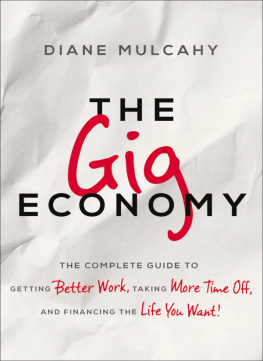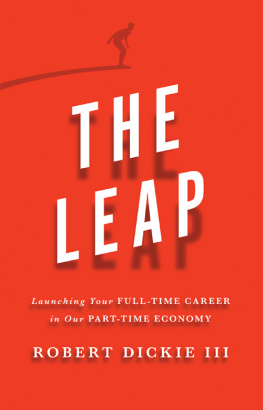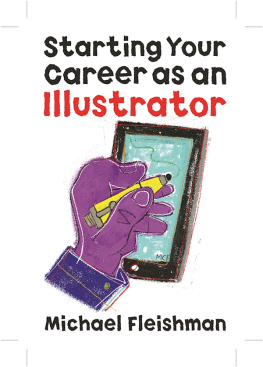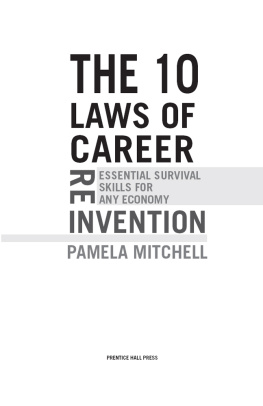The way that work works has changed. Work is no longer where you go, its what you do. Whether were just entering the workforce or seasoned pros, this fundamental shift requires a change in how we think. The Gig Economy provides a blueprint for thinking, planning and succeeding as an independent in this new world of work. It contains valuable insight and exercises for those who want to better understand how the new ways of working impact them. Combining self-reflection, practical financial planning ideas, and immediate steps that can be taken today, Diane Mulcahy both inspires and guides readers who are navigating the new workforce realities. This book should be on every working-age persons shelf; well-worn, marked-up and referenced over and over throughout our new, independent careers.
Diane Mulcahy deftly covers the fundamental drivers of the Gig Economy, as well as the mindset and behaviors youll need to succeed in this brave new world of DIY careers. Her research pierces our entrenched habits on what has kept us glued to the trappings of full-time jobs, and her wit liberates us with strategies for assembling a meaningful portfolio of gigs instead, along with a lifestyle that is unnerving as it is exciting. Read The Gig Economy to learn how to make work work for you.
How we work is changing, and that allows all kinds of people to really focus on making a life, and not just a living. The Gig Economy is a practical field guide for understanding these changes and navigating them with your greatest goals in mind.
Bulk discounts available. For details visit:
www.harpercollinsleadership.com/bulkquotes
Email: customercare@harpercollins.com
The Gig Economy
2022 Diane Mulcahy
All rights reserved. No portion of this book may be reproduced, stored in a retrieval system, or transmitted in any form or by any meanselectronic, mechanical, photocopy, recording, scanning, or otherexcept for brief quotations in critical reviews or articles, without the prior written permission of the publisher.
Published by HarperCollins Leadership, an imprint of HarperCollins Focus LLC.
Any internet addresses, phone numbers, or company or product information printed in this book are offered as a resource and are not intended in any way to be or to imply an endorsement by HarperCollins Leadership, nor does HarperCollins Leadership vouch for the existence, content, or services of these sites, phone numbers, companies, or products beyond the life of this book.
ISBN 978-0-8144-3734-6 (eBook)
Library of Congress Cataloging-in-Publication Data
Names: Mulcahy, Diane, author.
Title: The gig economy : the complete guide to getting better work, taking more time off, and financing the life you want / Diane Mulcahy.
Description: New York, NY : AMACOM , [2016] | Includes bibliographical references.
Identifiers: LCCN 2016023117 | ISBN 9780814437339 (hardcover) | ISBN 9780814437346 (ebook)
Subjects: LCSH: Part-time employment. | Flexible work arrangements.
| Quality of work life. | Career development.
Classification: LCC HD5110 .M85 2016 | DDC 650.1--dc23 LC record available at https://lccn.loc.gov/2016023117
Information about External Hyperlinks in this ebook
Please note that footnotes in this ebook may contain hyperlinks to external websites as part of bibliographic citations. These hyperlinks have not been activated by the publisher, who cannot verify the accuracy of these links beyond the date of publication.
DISCLAIMERS
This publication does not provide financial, legal, or tax advice of any kind, and AMACOM, Diane Mulcahy, and any of their representatives cannot guarantee that the information is accurate, complete, or up-to-date. While we made every attempt to include information that is current, AMACOM, Diane Mulcahy, and any of their representatives make no claims, promises, or guarantees about the accuracy, completeness, or adequacy of the information contained herein. Nothing in this publication should be used as a substitute for the advice of a third party. AMACOM, Diane Mulcahy, and their representatives assume no responsibility to any person who relies on information contained herein and disclaim all liability in respect to such information. You should not act upon information in this publication without seeking professional advice.
The author has made every effort to ensure the accuracy of the information within this book was correct at time of publication. The author does not assume and hereby disclaims any liability to any party for any loss, damage, or disruption caused by errors or omissions, whether such errors or omissions result from accident, negligence, or any other cause.
Some names and identifying details have been changed to protect the privacy of individuals.
To Kevin
for traveling with me
on the road less traveled
Take this job and shove it.
JOHNNY PAYCHECK
Five years ago, I created and started teaching an MBA course on the Gig Economy, which was still an emerging trend. The course gained immediate traction and was named by Forbes as one of the Top Ten Most Innovative Business School Classes in the country. Now the Gig Economy is a common topic in the media and has become part of the election cycle debates, but few people really understand how to navigate it to build a thriving, satisfying, and successful work life. This book, like my class, fills that information gap.
If we think of the current world of work as a spectrum, anchored by the traditional corporate job and career ladder on one end, and unemployment on the other end, then the broad range and variety of alternative work in between is the Gig Economy. The Gig Economy includes consulting and contractor arrangements, part-time jobs, temp assignments, freelancing, self-employment, side gigs, and on-demand work through platforms like Upwork and TaskRabbit.
Many of the topics in this book are based on what I teach, and many of the exercises are based on assignments that have helped my students succeed in the Gig Economy, and have led them to start new businesses, plan time off, restructure their finances, and begin to create lives that are more engaging, satisfying, and better aligned with their priorities.
The Gig Economy is still in the early stages of disrupting how we work. Only one generation ago, most workers could expect to be full-time employees in secure full-time jobs, working for just one or two companies over the course of their careers. The generation retiring now built a life anchored around the expectations of a stable and rising income, a steady package of corporate benefits, and a corporate-financed retirement at the end of work. That predefined climb up the corporate ladder is much less available to todays workers. Thats how rapid the transformation has been. In just one generation, the corporate gravy train full of plentiful, progressive, benefit-rich, and secure full-time jobs has left the station.
The MBA students I teach today are facing a very different work world when they graduate. They dont expect security from one job. Instead, they plan to hold multiple jobs over the course of their careers, most likely for the median tenure of just three to five years each. Their working lives will be made up of a variety of diverse work and work experiences.









